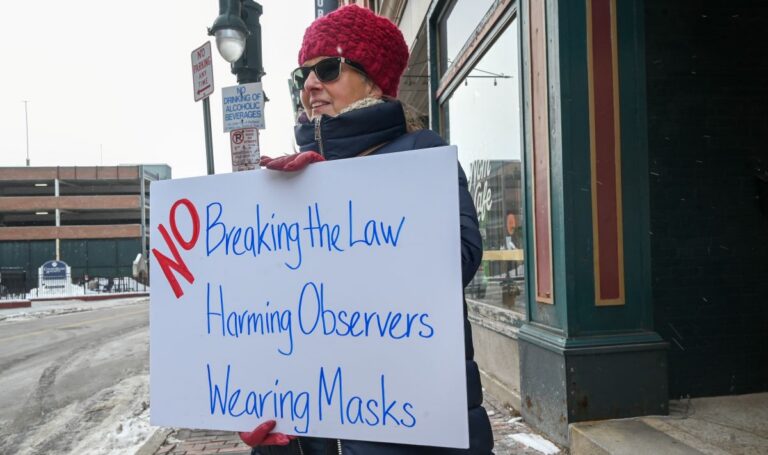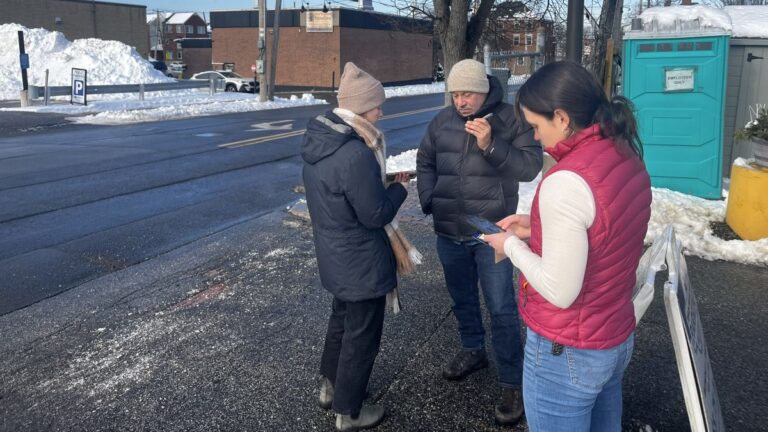Reade Francis Brower is the first to admit that much of the reason he now owns 25 Maine newspapers has to do with the woman who became his first girlfriend and eventually his wife.
“What do you see in him?” Martha McSweeney’s friends would incredulously ask when she and Reade started dating in late 1980. “He lives in his car! He barely has a job!”
Her answer was always the same.
“I always tell people I saw his potential. I just liked him, and when he said he was going to do something, he did it,” said Martha McSweeney Brower, who’s been with Reade since the night they met at a mutual friend’s Christmas party. “His word meant something. I believed in him.”
It was an origami bird on a Christmas tree that originally caught Martha’s eye.
Then a high school art teacher pursuing her master’s at Massachusetts College of Art, Martha searched out its creator at that party — a shy young man named Reade.
It turned out to be a lifetime conversation-starter.
“Martha said that she used to know how to make one but didn’t remember how, so I gave her a piece of paper and we each created another one,” Reade recalls. “She had learned from a book, I had learned by unfolding and refolding. When she said my way wasn’t the way the book did it, I smiled and said, ‘Why don’t you do it my way? It works.’
“She thought that was cute,” Reade said, smiling broadly. “I said that while she could probably make three birds to my one, I just get there differently, that I never learn anything traditionally, and I have a different way of doing a lot of things.”
Not a bad way of summarizing Reade Brower.
He does do things differently. His route from Living Out of a Rusty Car to Successful Businessman who acquired six of Maine’s seven daily newspapers in a span of three years (plus he prints the seventh daily and owns 19 weekly newspapers and several other specialty publications) has been anything but straight-line traditional.
How did he manage to pull this off so quickly? And perhaps more importantly, why would he want to invest in newspapers at a time when so many papers across the country are either profoundly struggling, folding, or being stripped of their identities by the media corporations and hedge funds that own them?
In several interviews with Pine Tree Watch, Brower, 61, laid out his unusual and sometimes comical path. He also revealed much about his colorful personality. Martha fleshed out his story from her perspective in separate interviews.
It starts with a love story
Martha has been a constant and unifying thread in Reade Brower’s adult life. Right from the start, he was intensely interested in the Irish-Catholic Bostonian five years his senior.
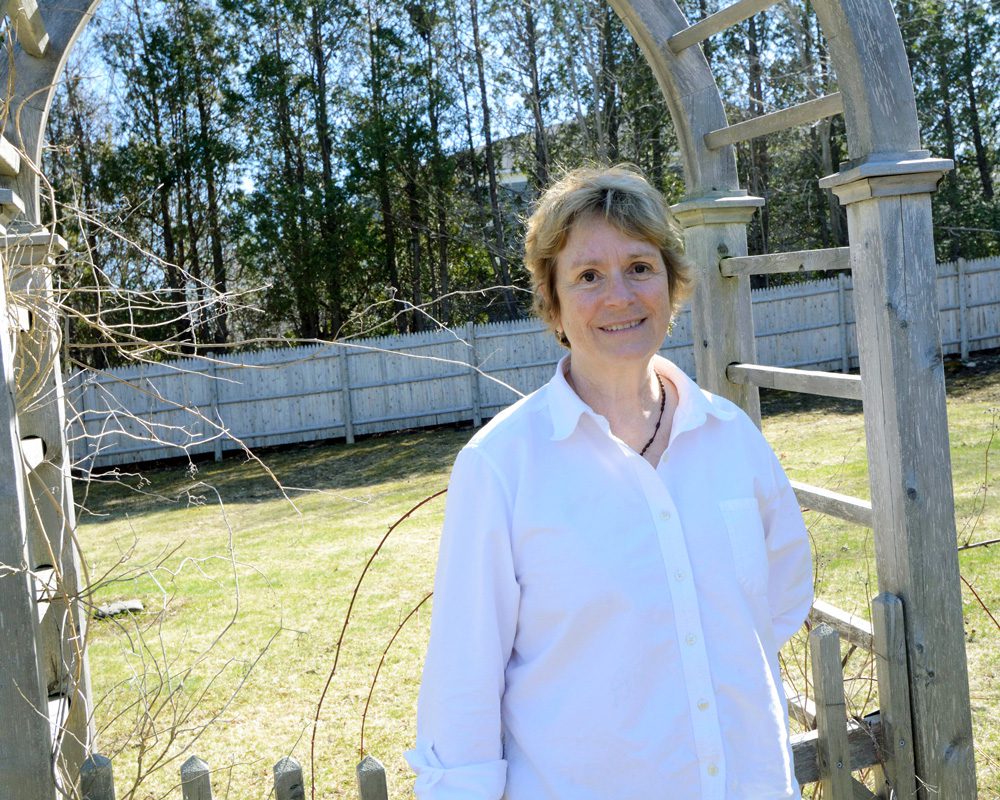
“It’s funny because I almost didn’t go to that party,” recalls Reade, noting that he’d alternately been living out of his car, couch surfing in Amherst and living with his dad in Brighton through the early winter of 1980.
“I was doing joint-compounding work on walls that day at my Dad’s business and came home exhausted. I headed to my room with a pizza and six-pack of beer, and said I was too tired to go to the party. My Dad said ‘you’ve been hanging around here for three months and never go out.’ He ordered me to go.”
So Reade put on his favorite pink shirt and reluctantly headed out.
He had just turned 24. He said he was fairly insecure and always too reticent to ask women out. He’d never had a girlfriend. He was the under-the-radar type in social settings.
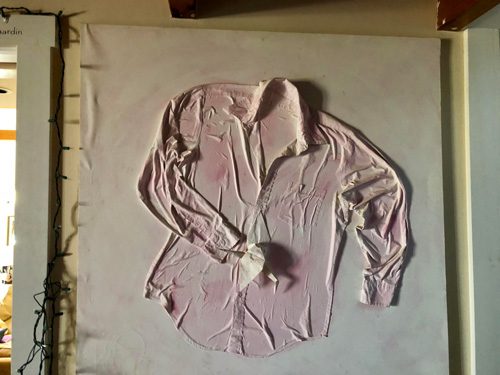
That snowy night, though, he felt a warm ease with Martha. At 1 a.m., Reade offered her a ride home. She felt safe and comfortable accepting, and en route, they stopped at an IHOP and talked until 5 a.m.
Many years later, when that restaurant was being renovated, Reade tried to buy one of its booths, but they weren’t being sold. So he asked about buying an IHOP mug, and they weren’t for sale either. But the manager, seeing Reade’s disappointment, said that he probably wouldn’t notice if one mug went missing.
Equally sentimental, Martha eventually turned his pink party shirt into a piece of art, soaking it in gesso, mounting it to canvas, and sewing ‘Dec. 20, 1980,’ the date of that Christmas party, onto its pocket. It hangs in the entrance to their Camden home. And over the years, she’s made him many gifts that feature origami birds, including a shirt and tie seen in photos all around Reade’s packed office at The Free Press newspaper building in Rockland.
A ‘complicated’ upbringing
Reade grew up in Westborough, Mass., with an Italian mother, Carmel, and German father, Richard, knowing he and his two younger sisters were adopted.
As he grew up, Reade didn’t bother to correct people when they mentioned how much he and his sisters looked alike. He came to know that his birth father was Jewish, but didn’t acknowledge this with schoolmates and others. He’d silently cringe at “jokes” using Jewish slurs, but Reade said he lacked the courage at that time to speak up about it.
“When I was a kid, I wish I would’ve taken initiative, but I wouldn’t, maybe because I was always this far away from being bullied by popular kids. I found some creative ways to be popular in a way, and it didn’t hurt that I had pretty sisters at my house.”
With an always changing, always interesting “complicated” home life, he focused on keeping the peace. “I lived by the policy that if you keep calm, it stays calm.”
There was friction between his agnostic/atheist dad, an inventor who “did a lot of work with the Air Force on something related to light sources,” and his mom, an office manager and secretary, who had grown up as a strict Catholic. He and his sisters went to a Unitarian church as a compromise for about five years when they were young “because my mother wanted to give us some religion as young people.”
His parents divorced when Reade was 11 or 12.
His mother fell in love and soon married a neighbor, who had six kids. Reade said this helped him become adaptable by necessity, as he gave up his room when his stepfather’s kids periodically came to live there.
Reade said he was a shy boy, and had a few eccentric things he liked doing. He laughs recalling obsessively writing numbers in a notebook and using a clicker to click a million times. He still loves numbers. And he loved playing Strat-O-Matic Baseball against himself – “I liked being able to strategize for both sides” – for hours.
In high school, Reade was a good student – “but I didn’t apply myself, I got B’s” – and was not involved in extracurricular activities.
Instead, he worked. A lot.
At times, he was a janitor, a bookkeeper, and he stocked shelves at a local department store. He took time out at age 17 to hitchhike across the country with a friend (he repeated the experience at age 20).
In college, he was more motivated academically, getting A’s at the University of Massachusetts-Amherst while paying his own way by always working.
One job was selling pizzas in dorms, starting freshman year.
“They gave me the most populated, all high-rises territory. I only got paid 28 cents per pizza – that was 20 percent of $1.40, but I was immediately able to sell 60 pizzas a night. I remember coming back and asking why they gave the new guy the best territory, and found out the guy I replaced had gotten robbed at knifepoint and never came back!”
That didn’t deter Reade.
“It was a great job for me because we got paid cash each night and it included the pizza of your choice at the end of your shift. I was on a five-meal plan, so that was helpful. It set me up for a lifetime of poor eating habits, of course,” he laughs. “I’d eat like a pig at 2:30 (in the afternoon) and then have a pizza at midnight with coffee!”
But it paid the bills and he wasn’t hungry.
Reade spent his junior year in an exchange program in Hawaii, and when he came home, he made a life-changing decision to start selling ads for the Daily Collegian, the UMass-Amherst college paper.
“It was my first experience working with a team of any sort, and I loved that. Plus, selling ads was a piece of cake for me after the worst summer job ever – selling cookware, door to door,” Reade said. “If I ever see that kind of experience on your resume, you have an in with me.
“I didn’t like the way the company operated at all, and that stuck with me. They browbeat you. Kind of like the coach who puts his arm around you after you’ve dropped the ball three times and says, ‘it’s OK, we’re gonna work with you’ versus the coach who screams at you that you’re an idiot.
“I learned a lot from that whole experience. It gave me an eye into the world of selling. It wasn’t so much that I really liked it, but I liked that the harder you worked, the more you got paid.”
Entrepreneurial fires are lit
When he graduated in 1978 with a marketing degree, Reade bicycled more than 100 miles to Martha’s Vineyard for a long weekend. Very long – he stayed 18 months. “I didn’t feel like biking back,” he explains, laughing.
Once he decided to stick around, Reade walked in cold to the offices of The Grapevine, a weekly alternative newspaper, looking for work.
“The owner looked at me, irritated, and said, ‘I don’t have time to deal with you. My ad director just quit.’ I told her that I had a marketing degree and knew how to sell ads, and she hired me on the spot.”
He made the most of that fortuitous timing, quickly impressing her with rapid sales, then moved on to Boston House, a disco, where he worked through the ranks from busboy to bartender.
Looking for a place to live with college loans to repay, Reade negotiated with a boarding-house landlord to rent an unheated attic for $25 a week rather than paying $50 for a regular room. “I could see my breath in the winter, but I had an electric blanket and was all set.”
When summer came around again, he and that landlord decided to start the free Martha’s Vineyard Magazine.
“It was really being an entrepreneur. I had to sell enough ads to pay for production. As he was passing out the magazine one day near the island’s steamships, he ran into a woman he’d known at the Collegian who asked if he’d like to team up to sell a coupon book at UMass. He thought the idea was worth trying.
The booklets were full of discounts for establishments near campus. The two sold ads, produced the books, then canvassed around dorms to sell them. The process took eight weeks and each earned $1,500. Reade was satisfied, but his partner, thinking it way too much work for such little gain, left to get a “real” job.
Reade and an ad salesperson he’s still friends with continued the venture and added a UMass phone directory, selling Yellow Pages ads. He was living out of his car.
It’s around this time that he met Martha. They dated for about a year before life took a turn northward.
Water Over Rocks … and some experiments
In recent years, Reade has thought a lot about how experiences in his 20s shaped his enduring habit of embracing opportunities without over-deliberating.
You know how water falls down over rocks? It might flow to the left, or to the right – we really don’t know. You can’t control where the water goes. Like that, I’ve ended up in different places for different reasons. You start out thinking one thing, and it changes. Martha’s Vineyard, for instance, was Water Over Rocks.”
When Martha’s teaching position was cut in 1981, she answered a Boston Globe ad – also now a piece of art in their home – to become an art teacher in Thomaston, Maine. She beat out 75 other applicants. Reade followed her, but Martha wasn’t ready to immediately move in together.
Finding a job proved challenging for Reade. He was turned down, again and again, including, he recalls with a laugh, being told he lacked the experience needed for a snow-shoveling job at the Camden Snow Bowl.
So, in typical fashion, Reade got creative. In addition to commuting to Amherst to continue a UMass housing calendar he’d been working on, he:
Started “a little wholesale business,” selling cassette tapes, sunglasses, batteries and other items at flea markets, convenience stores and fairs.
Created, sold and produced books marking the annual Friendship Sloop Days regatta.
Sold ads for and produced a series of seven Chamber of Commerce guides.
Created and sold coupon sheets in downtown Rockland, charging merchants for coupons and giving the sheets away.
“I was walking around putting the sheets into people’s mailboxes until the post office let me know it was a federal offense to do that,” Reade recalls, shaking his head at his youthful ignorance.
That mistake did, however, get Reade thinking about more effective ways of using the mail – a thought that eventually led to his first lucrative business and everything that has followed.
Martha urged him to correct what she saw as another mistake back then – his thinking an orange bathing suit, T-shirt and flip-flops were fitting work attire.
“I was saying, look, you don’t know a lot of these people, and you’re coming in looking like a bum. And when he finally tried dressing more professionally, he had an epiphany. He came home saying that people took him more seriously!”
Reade also applied ingenuity to his living arrangements, never letting a lack of funds get in his way. He bought his first house – later the first home of Rockland’s Free Press – for $10,000 in 1983.
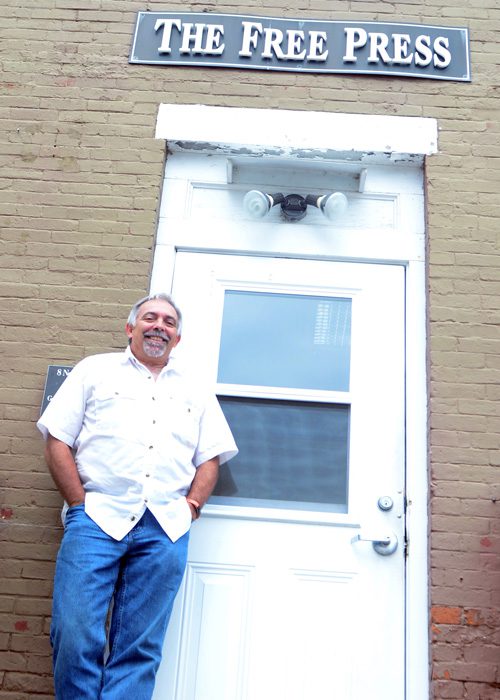
He managed this by withdrawing his cash limit – $2,000 – on a credit card to make a 20 percent down payment. On closing day, the bank fortuitously issued a $4,000 home improvement loan check, which Reade promptly used to pay off the card and start fixing the house, which he shared with a roommate for about a year.
Then Martha moved in to the little yellow house. At the same time, an intriguing offer came from “my one-eyed carpenter Bert, who helped me fix things for $5 an hour. He decided Martha and I would be good candidates to buy his 3-family house for $32,000. It had an assumable mortgage from the bank and Bert was willing to finance the rest with a second mortgage if Martha and I could come up with an $8,000 down payment.”
Martha had $4,000; Reade didn’t. So … he offered to take Bert’s wife shopping, using his Sears card to buy her a new washer, dryer and refrigerator totaling about $4,000.
Deal done.
During those years, Reade often considered starting an alternative newspaper in Rockland.
“I thought there was a niche, and I’d basically have the ‘fringe world’ to myself. I’d come from a place (Amherst) where there were five of me all trying to beat out a living in the alt world, and here there was just one of me. And I liked the fact that I felt like part of the community here.”
A big year for leaping
Reade and Martha started 1985 by honeymooning in Spain – before they got married in September. The reason? They knew their lives were about to get insanely busy.
And they instantly did when Reade founded The Free Press in May of 1985. His father, who is now 89 and living just behind the current newspaper building in Rockland, co-signed on a $5,000 Mastercard to make it possible.
Within four weeks of opening, the art director quit.
“Martha jumped in to help,” Reade said, “and suddenly she’s the art director working 100 hours a week. Our biggest worry was probably falling asleep on the job.”
With no money for a waxing machine, they used glue sticks to adhere the copy and ads to storyboards. They worked overnight Thursdays into Fridays, then drove a borrowed truck (and eventually a rundown school bus) to transport the paper an hour and 15 minutes away to Brunswick, where it was printed at the Times Record building.
Martha had left her teaching job and learned about mail delivery and bundling for postal routes – 53 for this carrier, 13 for that one – and spent Fridays making trips back and forth to the Post Office in their beat-up Toyota.
They found workers willing to help for little, and had a supportive community. A local grocer – and early Free Press advertiser – let them set up tables in his building to stuff fliers into the papers. The local office supply store gave them access during off-hours to make copies.
It was exciting, adrenaline-pushing – and utterly exhausting – getting the paper going, said Martha, recalling often putting this question to Reade, only half-jokingly: “Are you trying to kill me?! Because it was soooo many hours. But it was his vision, and he was making it happen. If you have a vision, the universe will help make it happen.”
As will hard work. In addition to putting in 80-100 hours a week at the paper, Reade was still making ends meet with his other ventures.
“Yep, I’m a publishing magnate who sells balloons on the side at fairs,” he’d joke in those days.
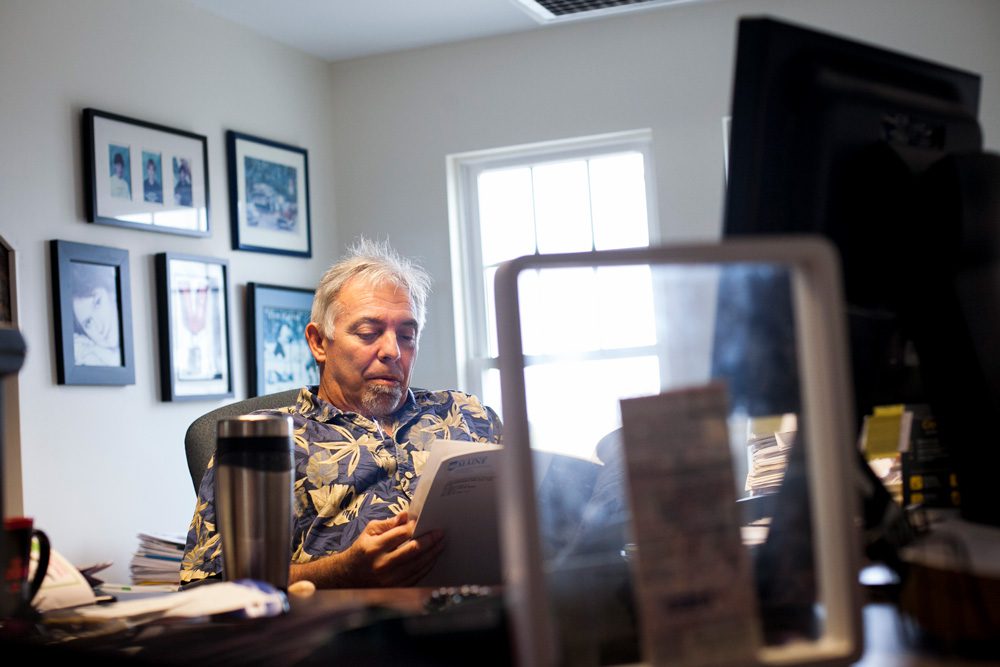
The Lost Decade and beyond
The grind was ongoing. When babies arrived in 1987 and 1988 (they now have Jesse, 30; Lucas, 29; and Isaac, 27), Martha helped as much as possible behind the scenes, but most heavy lifting fell to Reade.
And it started to take a toll, with the business seeming ever-less romantic. From 1981 to 1991, Reade concedes, his collective income was about $100,000.
With no laundry facilities in their cramped “basically horrible” efficiency, Martha hand-washed diapers and hung them around the apartment to dry. It was a big deal to finally get a washing machine that rolled up to the kitchen sink.
Martha said there were many times in the early years when she felt completely fed up.
“For the first couple of years, it seemed like every deadline was on a holiday. We missed Thanksgivings and parties and family get-togethers. I was watching my sisters buy houses and we were working like dogs.”
The Thanksgiving that someone broke into the newspaper office was a particularly low point: “I had a 1-month-old baby in a rockaRoo beside me while I cleaned up all the broken glass and busted up computers instead of being home cooking a turkey for my family.”
Martha and Reade refer to the time between about 1987 and 1997 as The Lost Decade. He was working so many hours, and when he took downtime – usually no more than half-days off on Sundays – he spent it sleeping, drinking, watching TV. “I wasn’t present,” he admits.
In 1989, Reade decided to sell The Free Press to two well-credentialed businessmen. The arrangement was for them to pay Reade 25 percent of the purchase price and then $20,000 a year for 10 years.
The deal provided some breathing room. And it allowed him to put a down payment on a house in Camden where they still live today.
“I figured I’d be getting $20,000 a year, but I still needed to work. I’d been doing the Chamber books while doing the paper, and decided to buy the Sunshine Guides,” he said, referring to 10 regional Maine travel guides later known as travelMAINE guides.
In a “creative” arrangement he’d come to regret, Reade paid for the deal by agreeing to lease the seller of the Sunshine Guides a new Mercedes every four years. The lack of an end date on the agreement eventually led to a lawsuit, settled with Reade retaining ownership.
“It wasn’t my finest moment,” he said. “Very few people like to live the way I like to live. I was fine with the arrangement, but nobody else was because it had no closure.”
Reade started 1991 unexpectedly back at The Free Press when its new owners failed to make promised payments and rent.
With three boys under age 4, “Martha was not happy — at all,” said Reade, realizing something had to give or he and his family would be right back in a major stress zone.
He turned operations of the travel magazines over to a colleague he’d hired, and became a silent partner in that endeavor. Alice McFadden, who had followed Reade to help with his new ventures, returned to the paper as publisher.
“Alice took over the driver’s seat and was glad to get me out of the building,” Reade said, laughing, noting he’s been entirely hands-off the news operation since 1992.
McFadden disagrees with being glad to see him go but confirms that he’s never interfered in all the time since.
“He’s aware of what goes on, but hands off in terms of control. He’s never asked us to do anything or not do anything,” she said, noting that with three young boys, he was “not eager” to launch back into the paper again at that challenging time.
Advertising had taken a huge hit, so it was an uphill battle to make the paper viable again. “When I sold it, ad sales were $780,000,” Reade said. “And when I took it back (in January 1991), they were $340,000. We had lost all inserts.”
A month later, he sought out Rene Nicole, owner of Wiscasset Ford, who had yanked his ads from several papers because he was tired of increasing advertising costs.
“(Nicole) had drawn a line in the sand and said no, but this was problematic because he was 100 percent print-oriented,” Reade said. “He needed to figure out what to do, so he and I worked on creating a booklet, which he inserted into the papers. I did the graphics and printing and coordinated distribution, but he wouldn’t put it in my paper. He didn’t like The Free Press. Thought it was a free throwaway and he was advertising in the (Rockland) Courier-Gazette and didn’t feel he needed us.”
By working to satisfy this key client, a grand new idea was sparked.
“Part of the problem was that Rene had Caribou Ford up north and didn’t like the papers there at all. He asked how else we could distribute the booklets, and I said, well, we can mail it. He said all right, but he only could mail 23,000 copies to stay in budget and wanted to do 40,000 for Aroostook County. I said I’d try to find someone to partner with us.
“It’s like carpooling. Instead of everybody driving their own cars, it’s worth your while to carpool and pay a little for the service. It’s a win-win philosophy bundling them. If each guy pays 12 cents apiece to mail, and you can do two at a time and charge them each 7 cents apiece, and I earn a penny on each piece, those 40,000 pennies equal $20,000 over a year.”
He contacted Ames department store, which also was sending ad fliers to The County, and it was happy to be bundled with Caribou Ford. He then added Grossman’s, and soon had Reny’s, Hannaford, Shaw’s – all being partnered and bundled to save money on mailing costs and avoid duplication.
Target Marketing Maine was born.
“We were doing this work in a shed at first. We had a labeling machine, and we’d do 40,000 labels in a week. Martha was the fastest at it, and we had a retired guy. We’d stay up all night doing the labels and get the bundles to the post office the next day.”
As word of mouth and customers quickly grew, Reade made Target Marketing his full-time job in 1993. He couldn’t know it then, but this particular venture would enormously expand his fortunes and opportunities.
When Nicole died in a plane accident in the mid-90s, Reade started branching out to other auto dealers in Maine, and then the region, and it was an enormously well received.
“It happened quickly. The pennies really started to add up.”
As did the hours Reade was putting into his various ventures.
As he approached 40 in 1996, with three young sons, Martha worried about her husband’s health. She bought him a NordicTrack machine. “I knew he was never going to be able to keep up with the pace and that stress.” And to her delight, he started obsessively using it.
“I had to do something. I was fat, drinking too much and unhealthy,” said Reade, who also started running, gave up doughnuts and cigarettes and dropped 40 pounds.
Just as Reade was trying to emerge from his so-called Lost Decade and get healthier, as life would have it, his wife was experiencing the opposite.
Martha was just 46 when she was diagnosed with ovarian cancer in 1998. Her mother had died of the disease when Martha, the middle of seven children, was just 20.
“Me getting cancer was a wake-up call for our family,” said Martha, who had surgery and chemo treatments. “Reade had to take up the slack.”
“Our kids were 7, 9 and 11 when Martha was diagnosed, and I think I did really step up and I’ve never sat down,” he said. “There had been years when I wasn’t present, but I was very present during the cancer, and then for the better part of my kids lives with Martha.”
They recall the period when Martha was struggling through the treatments and trying to get better as being both awful and prompting necessary changes.
Reade hired a consulting firm “to do an analysis of my business and my dysfunctions” and welcomed advice when consultant Dick Hartkopf said his micromanaging style was creating unhappiness for him and the staff.
“He got me to stop telling people what to do. I trusted Dick and knew he was a lot smarter than I was, and he fixed things. It was a major step for me, but I was motivated. I wanted my life back so I could be a better husband and father.”
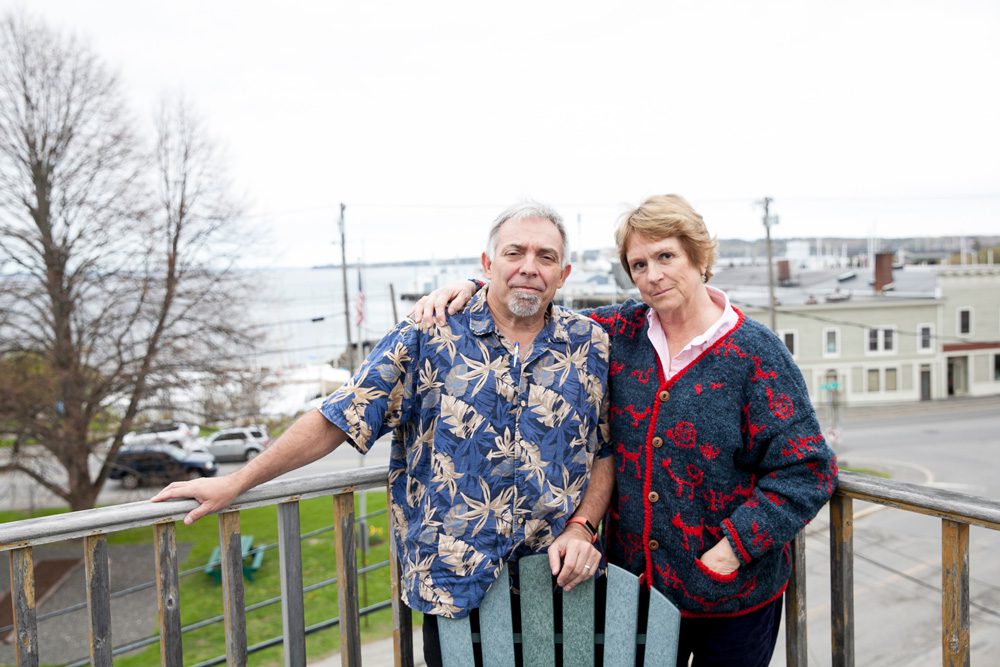
Downs, ups, life-altering choices
The next several years saw Martha conquering cancer and regaining her health (though she’d have another scare and double mastectomy in 2009) and Reade committed to being more involved with his family.
His professional energy was focused on Target Marketing Maine and Coastal Publications, a sister company he had formed in the mid-90s that was hugely successful – at its height, Coastal was producing 65 million auto catalogs in states scattered around the country. Reade also had Target Marketing operations in New Hampshire and Vermont that he turned over to a longtime business associate and friend to operate.
There definitely was no longer a need to sell batteries and balloons.
In 2004, Reade made a decision that would forever change his financial future by selling Target Marketing and Coastal Publications for, as he calls it, “a bundle” to Autotrader.
He was 48, healthy, wealthy, and seeking his next adventure. Reade had signed a five-year non-compete agreement as part of the Target Marketing deal, so mail-related business activity was out.
“I didn’t want to retire. I didn’t want to interfere with The Free Press, but I did want to keep us solvent and help indirectly, and keep my assistant, Andrea Space, employed. This idea of a print co-op came to me. I had all these relationships with other publishers because of Target Marketing, and I figured I could get some of them to get together for printing.”
In Brower style, he asked his cross-town competitor, the Courier-Gazette, to join forces. The Courier had numerous corporate printing clients, and Reade thought applying his bundling concept for group discounts on printing at the Courier presses had merit.
“I’d pay the bills, and they’d save money. It was win-win-win.”
It proved successful, and by 2009, when Reade’s non-compete limits ended, he said he was happy managing the printing co-op, especially with Wiscasset Ford back as one of his clients.
He eventually had more clients than the Courier could accommodate and started having some jobs printed at the Times Record. All was going well.
But two years later, the Courier Gazette got into financial trouble and couldn’t maintain its presses or pay its bills in a timely way. “We decided I’d take all their commercial work and bring it all to the Times Record, doubling the Times Record volume.” And the Courier had its own paper printed by the Lewiston Sun Journal.
“I got all this new business, I was happy,” Reade said.
But within a year, the Courier-Gazette’s financial problems had deepened. Reade was paying the Times Record but wasn’t getting reimbursed by the Courier.
The Courier-Gazette abruptly shut down one Friday afternoon in 2012, and Reade got a call the next morning from First National Bank asking if he could come in that day.
“It didn’t want to be the bank that closed the local paper,” Reade recalls. “The president of the board said, for the community’s sake, would I think about taking on this asset and the 38 jobs that are at stake. I didn’t want to do it, but … Water Over Rocks.”
On the following Monday morning, he signed the papers giving him ownership of Courier Publications, which included the Rockland Courier-Gazette, the Camden Herald, the Belfast Republican Journal, and the now defunct Bar Harbor Times and Capital Weekly in Augusta.
And suddenly, Reade Brower owned his competition in Rockland and several other papers. That led to to more purchases – none of which was planned, Reade said.
A series of rapid-fire acquisitions … and a big ‘Wow’
Next up was the Times Record printing operation, now known as Alliance Press.
“I was seeing a lot of news about its financial stability. It was highly leveraged and having trouble refinancing with its bank. I was nervous. What if they, too, turned the lights out? It would be disastrous for me and my co-op friends. My biggest fear was that I would be able to save myself, but the co-op guys would drown because there weren’t enough lifeboats. I didn’t want to be put in the position of deciding who got lifeboats.”
The most reasonable solution, to him, was to buy Alliance Press, which he did in 2012.
“Now I owned a press building and these newspapers and that’s where I was hoping to stay put. But now I have to fill the press to make the printing equation work. So it was, let’s go out and get some printing.”
He aimed high. Knowing the costs of printing the Portland Press Herald/Maine Sunday Telegram were exorbitant and that MaineToday Media was faced with spending $15 million to replace an inefficient press in its South Portland facility, Reade approached publisher Lisa DeSisto and owner Donald Sussman’s assistant about having the papers printed in Brunswick.
“There was some interest, but there were too many impediments. They were negotiating with bank debt that came along with Sussman’s purchase, they did not have a contract with the union.”
Printing MTM publications in Brunswick just wasn’t feasible at that point.
But in early spring 2015, after hearing through the grapevine that the bank issue was settled, Reade sent Chris Miles, Alliance Press’ CEO and minority partner, to meet with Sussman to revisit the subject.
“Chris called me after and said, ‘Are you sitting down?’ and I said, ‘I’m driving. What? Did we get it?’ and he said ‘No.’ And he paused. ‘Donald asked if you’d want to buy the paper.’”
Reade was stunned.
“That was a wow moment for me because I wasn’t expecting it. I stopped my car and just sat thinking how the hell did this guy in flip-flops and a bathing suit selling coupons in Rockland wind up with the Portland Press Herald? I was in the right place at the right time.”
Water. Over. Rocks.
“I realized in that wow moment that I was capable of doing it. That I could keep the majority of jobs, successfully create union with the union, and most definitely figure out the printing problems. And that alone could create big savings in materials. Donald had fixed the truck, and he just needed someone who could drive it.”
The deal came together quickly and included MaineToday Media’s Portland Press Herald/Maine Sunday Telegram, the Kennebec Journal in Augusta and the Morning Sentinel in Waterville.
Number of Reade Brower-owned Maine daily newspapers in 2015: Three.
But wait … there’s more
The benchmark purchase prompted a flurry of change.
Within a year, MaineToday Media’s inefficient press in South Portland was replaced – for a fraction of the estimated cost.
Reade now has a 10-year lease with three 10-year renewal options on the 170,000-square-foot South Portland building. Most employees have been moved there from One City Center in Portland – where the company was paying $40,000 a month for rent and $100,000 a year for parking. Alliance will relocate to the South Portland plant in February – the Brunswick building was sold – and additional presses are being installed to produce the Alliance work.
As Reade’s ownership transition was happening in Portland, he said the Lewiston Sun Journal’s owners – five Costello family siblings – were beginning to contemplate an exit strategy and facing press improvement expenses in 2016.
Last summer, the Costellos agreed to sell their entire operation to Reade’s organization, and in August, he bought the Sun Media Group, which includes the Sun Journal, its printing press and 16 other publications, including
The Forecaster papers in southern Maine and weeklies in western Maine.
Number of Reade Brower-owned Maine dailies in 2017: Four.
Reade also had quietly acquired two Vermont dailies in 2016 – the struggling Times Argus in Montpelier and the Rutland Herald, longstanding papers that were “valuable parts of their communities.”
Reade also had quietly acquired two Vermont dailies in 2016 – the struggling Times Argus in Montpelier and the Rutland Herald, longstanding papers that were “valuable parts of their communities.”
The purchase happened essentially as a favor for Chip Harris, a longtime friend he’d done business with for years. Harris had suggested the publisher of those Vermont papers get in touch with Reade.
“Basically, they’d waited too long to make changes and (the publisher) was way in over his head financially,” Reade said. Harris and Brower agreed to buy the papers together and see if they could get them back to good health.
Within 18 months, the Vermont holdings were much healthier. And in an interesting business deal in April, Reade offloaded the two papers – by trading them for the Times-Record and Biddeford Journal Tribune dailies in Maine.
The Brunswick & Biddeford dailies had been owned by George “Scoop” Sample’s Sample News Group and printed by Brower’s organization for many years. The deal also included Mainely Media weekly publications – the Kennebunk Post, Biddeford Courier, Scarborough Leader and South Portland Sentry.
Sample owns papers in New Hampshire, so for proximity and other reasons, “it made sense for us to make the trade,” Reade said.
Number of Reade Brower-owned Maine dailies in 2018: Six.
With breathless speed, a tireless go-getter with often unconventional approaches has managed to accumulate six of Maine’s seven daily newspapers.
This turn of events has not surprised Alice McFadden, who has known Reade since the first week of The Free Press 33 years ago.
“There’s nothing about this that surprises me,” she said. “He’s always surprising and unorthodox. But at the same time, he’s incredibly down to earth and wonderfully personable. It doesn’t surprise me because he’s always been open to doing something else, to starting something new. And he has a sharp mind and can evaluate things. It’s been a delight to watch this and his evolution.”
Brower, however, says he’s had no grand plan, that each opportunity has simply led to the next, so some developments have surprised him. He says his motivation to try new ventures comes from feeling a responsibility to use the gifts he’s been given.
“I’ve always strived to excel, always felt that to be important in my DNA. But the other piece for me is the concept of ‘unique potential.’ ”
Reade said this tenet of Hyde School – the boarding school in Bath where their sons went to high school – has made an enormous impact on him, that “each person is gifted with a unique potential that will determine their destiny.”
“I believe that when it’s your turn, you have to get up and take your turn. I really felt I was uniquely positioned to take these proud entities on to the next step of their journey and figure out what to do with them.”
And what unique talents qualify him for this daunting task?
“As Martha likes to say, I’m a Puzzle Boy. I like to put the pieces together, and I’m good at it. And I can fit them together in ways others can’t. Like the origami bird, folding it differently.
“And this has one more caveat for me. I believe that the ‘win-win’ in life isn’t enough and have always tried to create an extra ‘win.’ My belief in a ‘win-win-win’ formula is part of what I consider ‘my unique potential.’ Putting the puzzle together is important; equally so is the way you look at defining the puzzle pieces themselves. And when you get the opportunity to move the world forward, you must say ‘yes’ if you want this unique potential of yours to determine your destiny.”
What comes next?
Reade Brower says he has no plans to acquire Maine’s seventh daily, the Bangor Daily News. Right now, he’s keeping an eye on progress and challenges at his papers and focusing on his eventual legacy.
“I’m 61, and I’ve got to figure how to give back. I don’t want to leave my children my burdens, nor do I want to leave them my riches. I want to leave the world a better place, and I believe in the pay-it-forward concept.”
Toward that end, he started a charitable non-profit in 2016 called One Community, Many Voices, modeled after President Jimmy Carter’s Carter Center on a much smaller scale.
The concept is simple: Helping neighbors in need through simple good acts that become contagious.
“This is very important to me,” Reade said. “Jimmy Carter is my hero, my role model. He operates on love, on high moral ground. He’s motivated me.”
Reade is also focused on staying healthy so he can bring such projects to fruition. He has continued running, completing 11 marathons and many other races, which he typically runs barefoot, claiming it’s easier on his knees and more comfortable in general. He likes to golf occasionally and said he believes in balance.
“Martha and I walked the Camino (de Santiago in Spain) for our 25th anniversary and spent our 39th on a Greek island at a writer’s workshop led by (best-selling author) Cheryl Strayed. This summer, I’m taking the kids to Spain for the Running of Bulls in Pamplona.”

Ever the love story …
Reade said he’s also trying to make sure he gives Martha a turn to shine.
She’s working on a second master’s, in creative writing, and contributed an intimate piece about her relationship with Reade to an audiobook called “Nevertheless We Persisted.” Reade proudly noted that the book was a 2018 finalist for a prestigious Audie Award – the audiobook equivalent of an Oscar. He and Martha just got back from New York City, where he donned a tuxedo for the first time in his life for the awards ceremony.
Though their life together hasn’t always been easy – frustrations tempted her to leave on occasion “but there was no place for either of us to go,” she remembers, sighing and smiling – Martha said she feels lucky to share her life with Reade Brower.
“I’ve been very fortunate. He’s a very loving guy. He’s ruled by love. And he’s an honest man. He’s really funny and quirky. He’s also very curious and interesting, inherently. He’s my best friend, and I still really like him.”
Asked if Reade could have taken the steps and risks he has without a partner like her, Martha McSweeney Brower rises to her feet and raises her hand, smiling. “No!” she says, emphatically. “No way. He couldn’t have done it without me.”
And without hesitation, he concurs.
“Having someone behind you who just believes you can do it and trusts you? There’s no better feeling,” Reade said, making note of a friend who “was every bit as entrepreneurial as I am” but had a wife who stifled his independence and attempts to pursue various things. “I’ve been profoundly lucky and grateful that I’ve had that.”
Martha notes a small sign in their living room that summarizes how she and Reade have made their way through life together. It somehow caught her eye, she said, laughing. It reads: “Trust your crazy ideas.”





